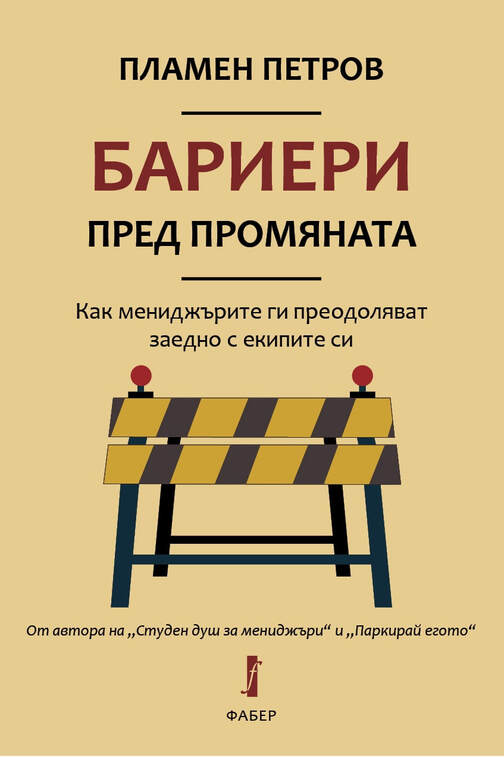|
Една типична грешка на новопромотираните мениджъри е да се опитват да създадат екипи с хора, които силно приличат на тях. Това е естествен и силен инстинкт в съзнанието за продължаване и правене повече от нещата, които вече работят добре.
Ако един мениджър в предишната си позиция като специалист е успявал да се справи с работата си само благодарение на извънредни часове, съвсем нормално е да търси хора в екипа си, които също са склонни да работят извънредно и с високи натоварвания в кратки интервали. Това може да е обективно условие за справяне с работата, но може и да е субективно условие, валидно само за този човек, който е по-бавен от останалите. За неготово насмогване с работата са му необходими извънредни часове. Да идва пръв на работа. Но за сметка на това да си тръгва последен. Вместо това, по-удачно е мениджърът да изисква от хората си да постигат същите резултати, или дори по-добри от тези, които е постигал той. А не да се фиксира върху поведенията и индивидуалния работен ритъм на всеки по отделно. Ако се фокусирате върху резултатите, а не върху поведенията, ще създадете здравословно пространство, в което хората използват собствените си силни страни, а не се превръщат в клонинги на мениджъра си. Това е лесно да се каже и не толкова да се направи. Затова, ако забележите, че екипът ви е започнал да прилича на сбор от клонинги, които не си постигат резултатите, може да се запитате: Аз искам екип, който постига резултати или искам екип, с който ми е удобно да работя?
0 Comments
"It is never too late to be what you might have been."
George Elliott There are two main types of managers - thermometers and thermostats. 1) The first type of managers - thermometers - simply show the temperature of the environment in which they work. When the temperature is too high or too low - they just show it on their screens. Nothing more. Temperature, of course, is a metaphor for the energy level at the workplace. If there is a good amount of energy, it means that there is enough of these factors: - Willingness and desire for change, improvement, and development; - Seeking and giving feedback; - Initiative and proactivity; - Motivation and inspiration; 2) The second type of managers - thermostats - set what the temperature should be and make it so. The easiest thing in the world is to be in a good mood, to have enthusiasm for work, and to be productive when everyone around you is in a similar state. Then things happen almost by themselves, the entire team is in the so-called "flow" state. If everything worked fine all by itself, there will probably be no need for managers. Here, with or without a thermometer (manager), the team naturally reaches and maintains an internal company homeostasis. Homeostasis is a property of an open system to regulate its internal environment through some regulatory mechanisms. These regulatory mechanisms in an office environment are the managers. They do not create the balance in the system per se, but they help the system to self-regulate through their continuous feedback and steering. This happens when the manager is like a thermostat - he sets the temperature and he makes sure it is at a certain optimal level. Teams do not need thermometer managers - the ones that work only as sensors for the external environment and external problems. Teams need thermostat managers who have the vision of optimal temperature and help teams reach this state of dynamic homeostasis. The characteristic of this homeostasis is that it is dynamic, i.e., if analyzed at the micro-level, there will be a temporary imbalance and perhaps slight creative chaos. From a technical point of view, the thermostat is a device that, with the help of temperature sensors, measures the actual temperature, compares it with a previously set temperature, and adjusts it to the set value. If we continue the analogy for the thermostat manager - first, you need to be clear about what temperature you are aiming for. In the beginning, I listed the things for which this temperature can be a metaphor - energy, proactivity, inspiration, etc. If these are not at the level that is healthy for the team - your job is to do something. For example, to give feedback, to align expectations, and to adjust the workload. Do not just reflect the outside temperature like a thermometer. There are only two things in your work that are within your control: your time and your energy. Both time and energy are the main levers you can use to set the right temperature for the team and yourself. You have a limited amount of time and energy every day. It makes sense to use them carefully. One way some managers do this is by limiting the number of decisions they have to make each day. Thus, they limit the use of their energy and focus on the small number of decisions that have a potentially large positive impact on the business. This can happen by following this rule of thumb: Every decision in the company has to be made at the lowest possible level, for which there is competence and decision-making power. Adherence to this principle reduces duplication of work. Some other important questions to consider: - What is your internal thermostat? - How do you use it? - How do can make sure it works properly? Spend some quality time answering these questions. Then ask your team the same questions. Here you can directly use the Socrates method and turn all the thermometers on your team into thermostats. Starting with yourself. *** "Cold Shower for Managers: Empower and Inspire Your Team with Your Humility and Accountability" by Plamen Petrov on Amazon - https://amzn.to/2Ka23CU *** "Park Your Ego: Face Your Bullsh*t and Own It" by Plamen Petrov on Amazon - https://amzn.to/3iJCYv9
Малко парадоксално, но основната причина за съществуването на повтарящите се проблеми в екипите е тяхното непосредствено и бързо решаване. И още по-точно - нерешаването на проблемите, които създават проблемите.
Например, когато има повече болни от очакваното, се спират отпуските. Решава се проблема с недостига на хора към момента, но дори не е зададен въпроса за това кой проблем всъщност създава проблема с многото болнични. И така до следващия път, когато отново се появи лавина от болнични. Тогава отново се спират отпуските. Отново и отново. Ако вниманието на мениджърите се насочи не само към решаване на настоящия проблем, но и към решаване на проблема, който причинява проблема, тогава нещата ще изглеждат по различен начин. Хроничните проблеми ще станат еднократни. Ще се прекарва повече време в анализ и адекватно планиране. И по-малко време в гасене на пожари и обвинения към другите и обстоятелствата. Тогава се появява въпросът: Какво спира мениджърите да решават хроничните проблеми, които предизвикват ежедневните проблеми? Колкото е по-голямо разстоянието между причина и резултат, толкова ще е по-трудно на мениджърите да направят точен анализ за това кой проблем причинява проблема. Тук с пълна сила води до объркване предубеждението за това, което се е случило най-скоро във времето е основният причинител на проблема. Това често не е вярно. Ако използваме горния пример с болничните - може да се окаже, че увеличените болнични идват от хора, на които наскоро им е била отказана отпуска. Но това не означава автоматично, че те са си взели фалшиви болнични след отказаната отпуска. Може наистина да са се разболели. Но е вероятно болничните да са се появили и по много други причини - работно натоварване, влошаване условията на труд, екипни конфликти, стрес и т.н. И отново за финал. Проблемът не е в появата на ежедневни проблеми. А, в не решаването на хроничните проблеми, които предизвикват ежедневните проблеми. --- Обучение за мениджъри в Zoom - http://www.equinox-partners.bg/effective-communication-and-motivation-for-managers-161860.html -- 3-месечна програма за развитие на ключови мениджърски умения (по заявка на една компания с мениджъри в групи до 12 души) - http://www.equinox-partners.bg/management-development-program.html  Автор: Венелин Минчев Аз съм Венко от Екуинокс Партнърс и това е първото ми за тази годината включване по темата за Екипна eфективност. Това е една от темите, която е вечно актуална и много позната - в някои екипи до (нежелана) болка. За други е изтъркана или старомодна и там нещата са оставени на самотек. Но има и организации, в която тя живее и се развива съвсем естествено и на ежедневна база чрез енергията и съзвучието на гласовете. Този пост беше провокиран и вдъхновен от една метафора за ЕЕ (екипна ефективност), която участник в една от нашите програми за развитие на ЕЕ използва, за да я опише и която ме накара да се замисля и да споделя прозренията си с вас. Както виждате от заглавието на поста, ЕЕ е една песен - песен, в която има съзвучие на гласове. А кои са гласовете в песента – разбира се гласовете на хората от екипа J И когато става въпрос за ЕЕ, ясно е, че я има под една или друга форма, в една или друга степен, но винаги ръководителите на екипи задават и търсят отговора на един въпрос – Как да повишим ефективността в екипа и да постигаме заложените резултати (че дори и да ги задминем)? Единият от работещите отговори и предпоставки за висока ЕЕ през метафората е като създадат среда, в която има съзвучие на гласове. Преди да ви споделя моята перспектива за „съзвучието“ и какво стои зад него, нека се върнем една стъпка назад. За мен има 2 основни начина, по които ръководителите на екипи могат да постигат целите си, независимо дали екипът е ефективен. Единият начин е трудният и е с цената на много конфликти, емоции, недоверие между хората, особено, когато ръководителят има авторитарен стил на управление, създава такава среда, в които тези поведения се проявяват и е ролеви модел за тях. Възможно ли е да се постигат целите в такава среда - възможно е, разбира се. Само че в дългосрочен план първо екипът трябва да оцелее и след това да мисли за ефективност. Вторият начин също не е лесен, но при него освен „твърдите“ показатели за постигането на целите като обем продажби, ниво на обслужване, качество на продукция и др., има още една категория невидими измерители, които в дългосрочен план са в основата и осигуряват високата екипна ефективност. Когато в екипите има доверие между хората, подкрепа, чувство за смисъл, синхрон и „съзвучие от гласове“, тогава тези невидими измерители стават предпоставка, съвсем естествено да се постигат и твърдите показатели. Но, съществената разлика от първия начин, която „прави разликата“ е, че хората нямат търпение да дойде понеделник и постигат целите си с удовлетворение, ангажираност и усещане за заедност. Именно там, ръководителите на екипи би следвало да насочат усилията и енергията си и по този начин да създадат среда, в която хората да посрещат предизвикателствата с увереността на валяк, проактивността на пчела и нагласата за „сериозна Игра“ . Звучи идеалистично, нали, и не казвам, че е лесно – нито за ръководителите, нито за хората. И все пак е възможно, и в същото време лесно, ако на ежедневна база тази философия се разпознава и утвърждава - и от хората, и от ръководителите. Но нека не размиваме отговорността за утвърждаването на тази нагласа и на личния пример, и да я върнем там, където тя принадлежи – при ръководителя на екипа. Сега да се върнем на „съзвучието на гласовете“ и мястото му в екипната ефективност. За мен съзвучието на гласовете е нюанс, който увеличава добавената стойност на тази втората екипна ефективност, където понеделника се чака с нетърпение от хората. Съзвучие на гласовете и в прекия, и в преносния смисъл, означава всеки глас на хората от екипа да бъде чут, разпознат и най-важното - всички гласове да бъдат в синхрон и баланс по отношение на индивидуалната им сила и спрямо цялостното звучене на песента – екипната цел. Ако задълбочим тази перспектива и приемем, че зад „гласа“ на всеки един човек в екипа стоят неговите индивидуални личностни и професионални характеристики. Тогава съзвучие на гласовете ще има, когато всеки един човек от екипа използва и проявява своите силни страни, личностни качества и отношение, до такава степен, че това да не е за сметка на интересите на другите и общата екипна цел. И може би в точния момент J. По този начин гласовете на хората се допълват и балансират, за да се получи една хармония, хармония, която пряко и категорично влияе върху екипната ефективност. Тук акцентът е дори върху личностните специфики на всеки един човек, тъй като опита, ценностите, вярванията и нагласите са различни. И именно тук са най-големите предизвикателства. За хората – да бъдат осъзнати за различията в гласовете на другите, да приемат тези различия (приемам≠примирявам), да умеят да балансират егото си в различните ситуации и да действат адекватно, отчитайки възприятията на другите и най-доброто за екипа в този момент. Забележете, че да бъдете осъзнати, да балансирате и да приемете, зависи само от вас или от конкретния човек. Нямаме контрол да постигнем това „от името на другите“. Затова в подобрението на екипната ефективност участва всеки един човек и същевременно тя започва първо с промяната на всеки един човек. Нужно е всеки да поеме отговорност като първо се фокусира върху своето себе-управление и си свърши вътрешната работа. Предизвикателствата за ръководителя – всичко споделено до тук, по отношение на хората, както и умението да създаде такава среда, че гласовете на хората да се вплитат един в друг, да се допълват и да се получи съзвучие. Още веднъж, никой не е казал, че е лесно, но добавената стойност от удовлетворението, постигането на резултати заедно и чувството за принадлежност, многократно ще надхвърлят цената на усилията, която хората ще платят, за да постигнат и след това да поддържат това съзвучие. И определено е постижимо, стига да го искате. В този момент ръководителите на екипи реагират: „Ама ние това го знаем на теория, звучи добре, но как да го постигнем на практика?“. Целта на този пост не е да ви давам готови рецепти, а по-скоро да провокирам размисъл по темата, самоанализ и предприемане на конкретни действия от ваша страна, независимо дали сте ръководител на екип или не. Въпреки това, ще споделя моята отправна точка за постигането на съзвучието, но ще оставя на вас удоволствието да изследвате и да си свършите собствената „домашната работа“, за да достигнете до работещите за вас отговори. Няколко са нещата, които ако се постигнат ще имат практически резултат. На първо място хората в екипа трябва да се познават и да са наясно – както със своите силни страни и области за развитие, така и с тези на колегите си. Второто нещо е искрено да поискат и да са готови (безпристрастно) да приемат обратна връзка от другите, особено за нещата, които имат негативно въздействие върху другите от тяхното поведение (повече в подкаста „Арка на дисторсия). С други думи, да искат да разберат, как другите ги виждат и какви са техните слепи петна, които пречат на екипната ефективност. Следващото нещо е хората искрено и с грижа за човека да дадат обратна връзка на другите за техните слепи петна и арки на дисторсии, които пречат на екипната работа. Това е само началото, но добро и обещаващо начало за мен. А как да постигнете тези неща и какво още може да се направи по въпроса, оставям на вашата креативност, постоянство и опит. И тъй като всяка промяна започва от поемането на лична отговорност и вглеждането първо в себе си, завършвам с един „широк“ въпрос за размисъл към вас: "Кое е това нещо лично у мен, което ако развия или променя ще подобри съзвучието на гласовете в моя екип? " Злепоставящи твърдения | Подкаст епизод 664
--- Обучение за мениджъри в Zoom - http://www.equinox-partners.bg/effective-communication-and-motivation-for-managers-161860.html -- 3-месечна програма за развитие на ключови мениджърски умения (по заявка на една компания с мениджъри в групи до 12 души) - http://www.equinox-partners.bg/management-development-program.html
"Discipline is the mother of victory."
Alexander Suvorov The daily team alignment (DTA) makes sense to be done regularly at two levels: - emotional level–it shows how people are feeling and what is the energy level in the team; - rational level–it shows the current priorities, the workload levels, and the business-critical tasks that should be turned around by the end of the day. That's it. No team fails because one-day things didn't go well. Team failures, and successes for that matter, result from systematic and constant actions that are repeated over and over again. One such action that should be done every day is the alignment of the team. Alignment means that all people on the team have the same understanding of the current priorities. Everyone should know what is expected of him, respectively, what he can expect from others. The DTA (Daily Team Alignment) is straightforward to do. And for the same reason, we often miss it. Just because it is straightforward. And because the results of one or two misses can remain unnoticed. But the same results begin to be seen very clearly when the misses become systematic. There is a relevant analogy with going to the gym. If you miss a workout, you will not notice much difference. You may even feel better because instead of training, you have rested or done something else. It is the same with the daily team alignment - if you miss once or twice, there is not much difference in the work; even people have freed up a little more time to catch up with the their workload. Both with the gym and with the daily alignment - the problem is not the one miss. The problem is when it becomes a leak every week. And notice that this happens gradually little by little until, at some point, it turns out that the team hardly gets together and everything is done on the go. The work will not stop suddenly. But it will reach a turning point where it will suddenly get worse. This will be the point where a few people are a little more overwhelmed, a little more nervous, and a bit too tired. Just a little is enough to get to where the more the work - the worse the situation. This scenario is not apocalyptic but just realistic. As soon as the people in the teams start wondering where they had gone wrong, it is time for taking a break and for some analysis. It is not a time to jump to conclusions. In the daily alignment, people will get to know not only their work and colleagues but also themselves. They will understand that the rational laws they have studied in universities rarely work at the micro-level in their teams. For example, economic logic does not suggest that a manager would prefer to change positions and work more for less money. But it happens. It happens often. Irrationality is not characteristic only of the people you work with. It is also characteristic of you. Think about how many of your career moves were rational and how many were completely emotional and without any sound logic. And more importantly, what resulted from the different types of decisions? You may now realize that the best moves in your career have been entirely irrational and emotional. But they felt right. One typical disadvantage of the daily alignment is that it becomes a routine and does not get to the conversation's heart. At one point, people may perform the alignment like a pro forma, and the entire team may suffer. Of course, this cannot happen without the "help" of the manager of this team. So, if you notice a sluggish or pro forma presence - there is no room to ignore it. Address it directly and respectfully. There will be days when someone, or even yourself, is at 50-60% of your capacity. Do not sweep things under the rug - if someone is not in a resourceful state to do their job—make some changes for the day. There is no sense to work at half speed. It is like driving a car with only half-cylinders working. When you make sure the cylinders and everything else are in order, it is time to race. *** Buy the book "Cold Shower for Managers" by Plamen Petrov on Amazon - https://amzn.to/2Ka23CU
Chaos of Overreaction
"There is no chaos in the world except the chaos created by our mind." Nisargadatta Maharaj Imagine that instead of washing five T-shirts at once in the washing machine, you decide to run each T-shirt separately. You can wash T-shirt after T-shirt all day long, be terribly busy, waste a lot of energy, but you will have only five T-shirts washed with five washing cycles instead of one. Something like this happens in teams that have zero tolerance for the "inaction" of planning. When there is no "real" work, but only talking about what needs to be done. In such teams, hustle, even an artificial one, is elevated to an internal cult. In such an atmosphere, people are frequently in a hurry, and they are always late for something. They jump from meeting to meeting. They have a constant hamster heartbeat. They are startled by every deadline and even more by every new emergency that may be more urgent than the current one. Panic and sprinting between urgent tasks create the illusion that big and important things are being developed. But at the end of the day - there are only five washed T-shirts. You can easily recognize the chaos of overreaction. First, if you notice that you are developing a hamster heartbeat yourself, you are parking and ignoring the new opportunities rather than exploring or discussing them. Second, if people in your office run between meeting rooms, forget their laptops at other people's desks, spill their coffee more and more often, and finally, they always open their meetings with "there's not enough time to do anything." By these signs, you recognize that you have a chaos of overreaction. What triggers it? Three primary reasons: - lack of clear priorities - inadequate resource planning - inappropriate people in critical places The ultimate responsibility for overcoming this chaos of overreaction lies with the manager. First, to clear this chaos from his own daily life. And then the manager to support the people in his team in this direction. Or even to find a third alternative that comes from the teams themselves. *** Buy the book "Cold Shower for Managers" by Plamen Petrov on Amazon - https://amzn.to/2Ka23CU
I Can't Fix Everything. That's Why I Won't Fix Anything
"The hell you can endure is just as great as your love." Ayn Rand In moments of heavy workload and chaos, some managers fantasize about giving up and quitting. Binary thinking appears, even thoughts of self-sabotage with sentences like this - "I can't fix everything, that's why I won't fix anything". This is a natural defensive reaction. But these moments are very suitable for something else instead of giving up. They are perfect for taking a break. One of the easiest ways to get out of this black-or-white thinking is to take some time to have a rest. Then to focus only on what can be fixed immediately. And only then focus on the other things. Thus, the work takes off, and the feeling of control over your environment comes back. The other stream of attention, of course, is on the people in your team. Those who are also on the verge of burnout are likely to have fallen into the trap of binary thinking - all or nothing. You can support them in the same way - first, ask them to take a break. Only then help them to focus on what they can impact directly. The key thing here is to control the controllable and not to be overwhelmed by the petty details of the days. *** Buy the book "Cold Shower for Managers" by Plamen Petrov on Amazon - https://amzn.to/2Ka23CU
"Torn by hesitation, we often make decisions that lead to new doubts."
Sylvia Crystal Many managers go into the corridors of misunderstood diplomacy, being silent about things they disapprove of. But yet they hope that the surrounding people will read their minds and correct themselves. This self-regulation might happen sometimes. But it most often occurs in managers' dreams. Not in the real world. Hoping that someone else will read your mind and come up with a solution to a problem that bothers you is as probable as turning a spring rain into a Morse poem. With few exceptions, most people cannot read minds. Most people understand their managers' messages as soon as they turn them from thought waves into vocal waves. Although mind reading is not widespread, the hope that someone else will apply it and read your mind is. No one can read your thoughts, for example, that you don't like someone being late, interrupting you, or looking at his phone while you're talking to him, etc. What causes frustration among managers is not the actions mentioned above, but the fact the people they work with are not nimble enough. The actions that irritate you can turn from a source of irritation into a source of inspiration. The opposite of this "hope of reading my mind" is direct communication. It turns out to be simple. But not always easy. Let us say your colleague leaves his unwashed cup of coffee in the kitchen. Instead of telling him to wash his coffee cup directly, it would be better first to help him realize what it would mean for the entire floor if a hundred people left their cups like that until 10.30 h in the morning. The people on your teams are smarter than you think. You do not have to treat them like children because this behavior of yours will create people behaving like 35-year-old children. However, before asking questions, check whether you can ask them with a supportive rather than a judgmental and sarcastic tone. Because the highway of sarcasm will take you to the city of apathy.
"There are no desperate situations. There are only people who get despaired in certain situations."
Tibetan proverb The preconceived notions with which managers approach reality would also determine what they will achieve at the end of the day. At the end of the day, there are either results or excuses. Failure to achieve results should not be confused with a lack of commitment. Not achieving the results may be a sign of poor resource planning or extra ad hoc demands. Managers' ability to distinguish between objective impediments and fake ones will determine both the culture and the commitment to overcome obstacles and achieve results. Managers will always get more of whatever they tolerate. They do not endure poor performance. They tolerate poor performance. They do not endure a lack of resources. They tolerate the lack of resources. Getting into stories and drama can help Oscar nominees, but for people who want to focus on achieving specific goals, it can only lead to exhaustion and frustration. Tolerating drama will lead to a drama-heavy working environment. Tolerating productivity and high achievements will lead to more productivity. Challenging circumstances are not reasons for failure. They are simply the environment within which people must achieve results. The special thing about excuses is that there is a dose of truth in them. The attention paid to them has the effect of throwing gasoline on the fire. It will only ignite it. And it will lead to flames, fires, and missed opportunities. People's energy may go to making excuses why something cannot happen or just to make it happen. Some usual excuses are: - We do not have enough people; - We do not have enough time; - We do not have the understanding of the client; - We are not clear on what exactly they want, etc. Questions for your team that can help you turn excuses into a result-driven mindset: - Knowing that we do not have enough people, how can we achieve our goals, anyway? - Knowing that we do not have enough time, how can we still achieve our goals? - Knowing that we do not have an understanding of the client, how can we achieve our goals? - Knowing that we do not have clarity on what exactly they need, what can we do to achieve our goals? Managers may look at the excuses as a list of potential risks. Then they can focus on managing risks, not on drowning in a sea of excuses. The key element here is that managers should not rush to solve the problems of their people on autopilot. Rather, they should use the Socrates method and support their people to come up with solutions that are right for them. It is enough to create clarity and a sense of urgency, and the results will come. One barrier for people to enter 100% in finding solutions and acting is their unpleasant experience with a previous manager. One who has taken stories and apologies too much into account, rather than working to increase the capacity of his team to overcome those excuses. Some people develop a conditional reflex for finding excuses that lead them into the spiral of self-fulfilling negative prophecies. You must help your team make the turnaround. To turn the excuses into reason for success. Then, as people turn every excuse into a reason for their success, they will have a greater sense of control over what is happening to them. They will become active instead of passive participants - not only in their work but also in their life. |
Архиви
July 2024
|
__________________________________________
Copyright © 2011-2024, Equinox Partners Ltd. All rights reserved.
Copyright © 2011-2024, Equinox Partners Ltd. All rights reserved.











 RSS Feed
RSS Feed

